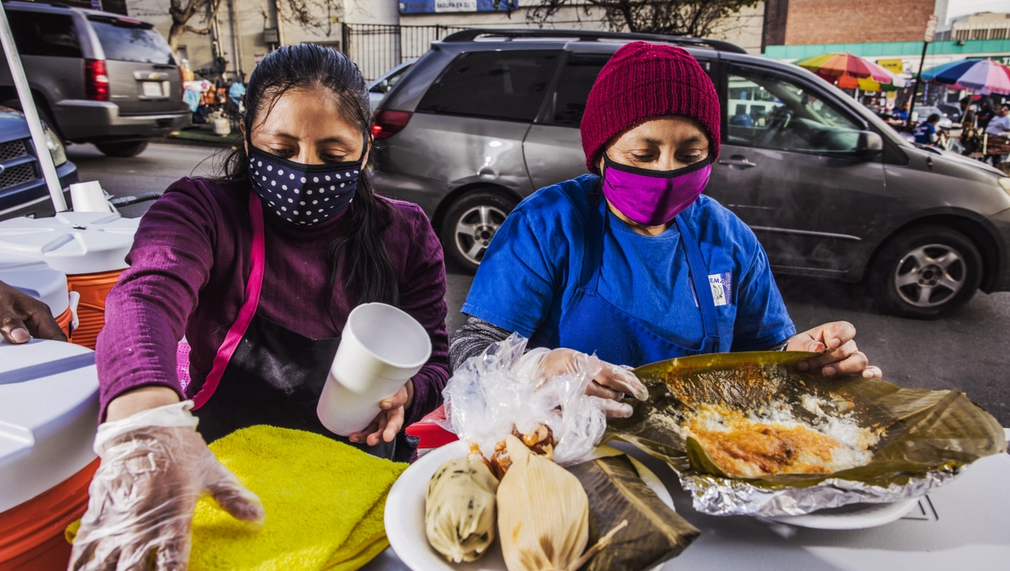Organizing Against Street Vendor Displacement
The street vendor movement in LA has won historic policy changes. However, implementation of vending programs has been haphazard and attacks on vendors from enforcement agencies continue. CPC will work with street vending hubs across LA to support the establishment of self-governance structures, support education on current vending regulations, mitigate interaction with enforcement agencies, and build a network of leaders from each hub that will organize against displacement and advocate for improvements to the city's vending program.

What is the primary issue area that your application will impact?
BIPOC- and Women-Owned Businesses
In which areas of Los Angeles will you be directly working?
City of Los Angeles
In what stage of innovation is this project, program, or initiative?
Expand existing project, program, or initiative
What is your understanding of the issue that you are seeking to address?
Although LA legalized street vending in 2019, investment in the infrastructure to support vendors has not arrived. Of the 50,000 vendors in LA, approximately 2,000 have obtained their permits to sell legally. The city has wasted resources investing millions on enforcement agents who lack cultural competency to lead “outreach and education” efforts, and therefore, the implementation of this program has not reached its full potential. Moreover, vendors in popular vending hubs, such as the Guatemalan Night Market, are often faced with threats of displacement under the guise of health and safety. The majority of vendors are women and senior and they find themselves in dire economic distress when displaced form their work. As we enter the recovery phase of this pandemic, we are seeing a re-emergence of street vending and a growing number of women taking on this work. We must protect these entrepreneurs from criminalization and displacement and supports their economic stability.
Describe the project, program, or initiative this grant will support to address the issue.
Our team currently organizes with approximately 2,500 street vendors in 24 vendor hubs across LA County. 70% of the vendors we work with are women and the main breadwinners in their family. Through this organizing experience, we’ve learned that an enforcement-heavy strategy does not result in compliance and only burdens poor working families with more fees. A different model must be developed in order to attain successful implementation. With the support of this grant, we will continue to disseminate important information on vending regulations and organizing efforts to all 24 hubs throughout the region. We will have a particular focus in 4 vendor hubs where we plan to build a model of self-organization that will lead to improved compliance with legal vending programs and mitigation of issues with other stakeholders. This model will include supporting vendor hubs in identifying and developing leadership, specially among women; developing community vending agreements; developing structures for self-governance and mutual aid; connecting vendors to hands-on technical assistance programs; and developing a network of vending leaders across all 4 hubs that can respond to displacement efforts and advocate and organize for improvements to the city's street vending program.
Describe how Los Angeles County will be different if your work is successful.
If our work is successful, street vendors across the LA region will be better informed about their rights, about LA City’s street vending program regulations, and they will be better equipped to navigate permitting processes. Popular vending hubs will be self organized through community agreements which will promote safe and walkable streets and opportunity for all street vendors. Hub leadership will work and mediate with other stakeholders in the community to address any issues pertaining to street vending and there will be no need to involve enforcement agencies. Women will turn to vending as an opportunity for economic growth and they will feel safe and supported. These hubs will serve as models for how to successfully onboard street vendors onto the city’s program. The City will invest in the development of other self-governing street vending hubs and in the sustainability of these economic enclaves. The City's legal vending program will reflect the real needs of vendors.
What evidence do you have that this project, program, or initiative is or will be successful, and how will you define and measure success?
Our team has successfully implemented a version of this project in 3 hubs. In 2020, we worked with 40 vendors at Expo Park to elect a leadership committee, create agreements on vending locations, and as a united front, negotiate with Expo Park management. This resulted in an agreement that vendors are allowed to continue vending, even though areas of the park are deemed no-vending zones by the city’s rules and regulations. Expo Park management directly contacts vendor leaders when issues arise before dispatching enforcement agents. At the Guatemalan Night Market and the weekend market on Main Street in South Central, which host approximately 100 vendors each, we've supported vendor leaders in mediating issues among themselves and with other stakeholders such as brick and mortar businesses and churches. Community agreements have resulted in less interaction with law enforcement, a better relationship with the local council office, and mitigation of displacement.
Approximately how many people will be impacted by this project, program, or initiative?
Direct Impact: 300
Indirect Impact: 2,500